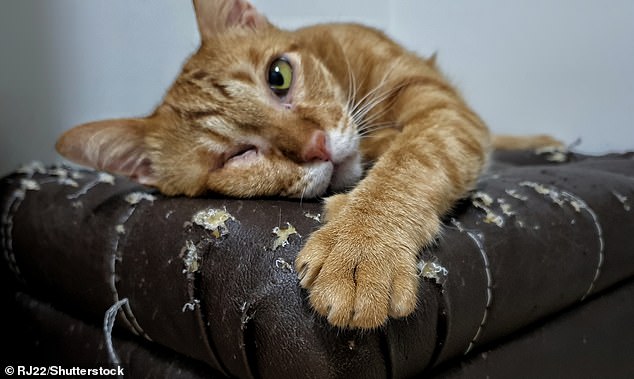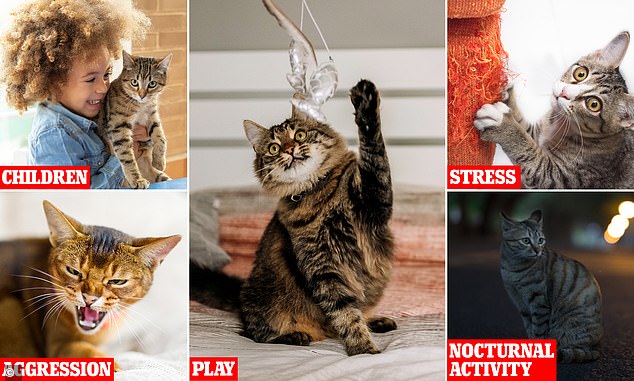- Stress, kids, and nighttime activity can cause your cat to scratch the couch
- READ MORE: A mutant cat? A genetic mutation gives cats unusual fur
Most cat owners will be familiar with the torn cushions, rugs and sofas that come as part of the package.
But a study shows that feline scratching instincts are exacerbated by stress, and small children are one of the worst triggers.
An international team of researchers has investigated what factors influence unwanted scratching behaviour in domestic cats.
The team, from Ankara University in Turkey, asked more than 1,200 cat owners in France about the daily lives and characteristics (as well as any unwanted scratching behavior) of their furry companions.
They found that the presence of children in the home, as well as high levels of play and nighttime activity, contributed significantly to increased scratching.
From the presence of children to nocturnal activity, there are many factors that cause your cat to scratch your furniture, scientists say
Lead author Dr Yasemin Salgirli, from Ankara University, told MailOnline: “‘Nocturnal activity’ in cats includes behaviours exhibited during the night.
‘Nocturnal behaviors, such as increased playfulness and vocalization, are often a result of inadequate daytime stimulation or social interaction and may also be a form of attention seeking.
‘While cats are naturally nocturnal, they can adapt to a human daytime schedule if provided with structured and engaging activities during the day.’
But researchers said stress was the main cause of the unwanted behaviour.
For example, the presence of children, especially when they are young, could amplify stress and be one of several causes that can make felines scratch due to stress, the team said.
Another factor that could also be related to stress is the love of playing: when cats play for a long time, their stress levels can increase due to uninterrupted stimulation.
Cats described as aggressive or disruptive also exhibited higher levels of scratching.
The team recommended placing scratching posts in areas where the cat frequently passes through or near its preferred resting place to reduce scratching on furniture.

Cats scratching furniture can frustrate their owners, but this normal feline behavior could be controlled by adapting play sessions and offering scratching posts in the right places, researchers have found.
Several short play sessions that mimic successful hunting scenarios can also keep cats interested and reduce stress, they added.
Dr Salgirli added: ‘Here we show that certain factors, such as the presence of children in the home, cats’ personality traits and their activity levels, significantly influence the extent of scratching behaviour.
‘Our findings may help caregivers monitor and redirect scratching toward appropriate materials, which could help foster a more harmonious living environment for both cats and their caregivers.
‘Providing safe hiding places, elevated viewing points and ample play opportunities can also help relieve stress and engage the cat in more constructive activities.’
The findings were published in the journal Frontiers in veterinary science.


